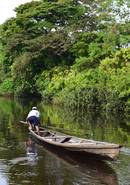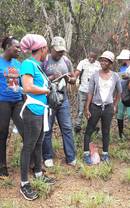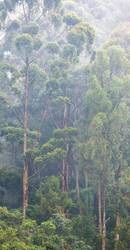Noticias

Under the common theme “From REDD+ Readiness to Implementation and Results: FAO’s support to countries”, a set of flyers was recently published by FAO. The flyers aim to facilitate countries’ reflection and decision-making on how to plan and implement actions to reduce emissions from deforestation and forest degradation.
The Paris Agreement provides a landmark global commitment to tackle one of the biggest challenges of our time: to keep global average temperature below 2 degrees Celsius above pre-industrial levels. Country commitments are reflected in their Nationally Determined Contributions (NDCs); REDD+ appears in many of them as a prominent component of the fight...

Supported by FAO and the Government of Canada, the project aims to contribute to the sustainable use of forest resources and reduce greenhouse gas emissions
On 9 August 2018, a new project was launched to promote conservation and the responsible use of the forests of Honduras and to reduce deforestation and greenhouse gas emissions in the country. The project will work with women as well as rural and indigenous youth from 12 municipalities in the Western region of the country, in the districts of Lempira and Santa Bárbara.
According to the Forest Reference Emission Level submitted by Honduras to the United Nations Framework Convention on...

On 23 July, journalists from 10 Latin American countries arrived in Colombia for a 4-day media workshop. Organised by the UN-REDD Programme with support from LatinClima, the media trip brought together journalists and media experts as a contribution to the ongoing international debate about the importance of tropical forests for climate change mitigation actions. The goal was to advance participants’ understanding of the importance of community-led REDD+ actions by exposing them to the real-life example of the COCOMASUR Community who recently developed the first REDD+ conservation project in Colombia that generated carbon credits for protecting the forest in a collective...

Following a ten-day intensive training program, the first Liberian National Forest Inventory (NFI) was launched on 4 June 2018 in Lofa County. Funded by the Forest Carbon Partnership Facility, the NFI is implemented by the Liberian Forestry Development Authority (FDA). For the first time in the country, the data collection for the NFI was fully digitised thanks to the use of the Open Foris toolkit.
According to FAO’s Global Forest Resources Assessment 2015, 43% of Liberia is covered with forests. The biodiversity of the Liberian forests is rich with endemic and endangered species. A large proportion of the country’s rural population...

Since 2013, the Food and Agriculture Organization of the United Nations (FAO) has been collaborating closely with the Virtual Center of Excellence on Forest Monitoring (CEVMF) to reinforce South-South Cooperation in forest monitoring. This partnership operates within the framework of the Mesoamerican Strategy for Environmental Sustainability that aims to deepen and diversify existing regional cooperation in environmental matters in the context of the growing economic, political and social connection between ten countries of the Mesoamerican region. National Forest Monitoring Systems (NFMS) in Latin-America have consistently evolved and progressed, thanks to the efforts of the regions’ numerous stakeholders and the increasing...

